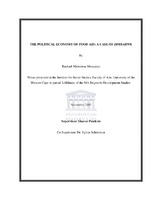| dc.contributor.advisor | Penderis, Sharon | |
| dc.contributor.advisor | Schweitzer, Sylvia | |
| dc.contributor.author | Munyanyi, Rachael Mationesa | |
| dc.contributor.other | Institute for Social Development | |
| dc.contributor.other | Faculty of Arts | |
| dc.date.accessioned | 2013-08-06T14:01:49Z | |
| dc.date.available | 2007/06/25 07:16 | |
| dc.date.available | 2007/07/03 | |
| dc.date.available | 2013-08-06T14:01:49Z | |
| dc.date.issued | 2005 | |
| dc.identifier.uri | http://hdl.handle.net/11394/1810 | |
| dc.description | Magister Artium - MA | en_US |
| dc.description.abstract | The food security crisis which gripped the sub Sahara Africa after the drought in 1999/2000 threatened development initiatives in these countries. Zimbabwe’s situation has since worsened and the country has failed to recuperate from the food problems, even after an improvement in the climatic conditions. International and local food aid activities then became a priority in the fight to sustain the right to food for the affected regions. It is argued in this research that if food aid is distributed on the basis of need it will enable the vulnerable populations recuperate form food insecurity problems. It is also postulated that if well implemented, food aid programmes are also able to play the dual role of averting starvation and leading to long term development. This thesis departs from the allegations of food aid politicisation in Zimbabwe. Using the rational choice and neopatrimonial theories of individual behaviour, this research endeavored to ascertain whether political decisions influenced the government food aid distributions which were conducted through the Grain Marketing Board. In line with these theories, it is argued in this study that politicians behave in a manner that maximizes the fulfillment of their individual needs rather than the needs of the people who vote them in positions of power. A qualitative approach was adopted in this study and data was gathered through household interviews in the Seke and Goromonzi districts of the Mashonaland East province in Zimbabwe. Furthermore, interviews were conducted with food aid experts from the governmental and non governmental organisations dealing with food security issues in Zimbabwe. | en_US |
| dc.language.iso | en | en_US |
| dc.publisher | University of the Western Cape | en_US |
| dc.subject | Food relief | en_US |
| dc.subject | Economic aspects - Zimbabwe | en_US |
| dc.subject | Food supply | en_US |
| dc.subject | Government policy - Zimbabwe | en_US |
| dc.subject | Zimbabwe | en_US |
| dc.subject | Economic conditions | en_US |
| dc.title | The political economy of food aid: a case of Zimbabwe | en_US |
| dc.type | Thesis | en_US |
| dc.rights.holder | University of the Western Cape | en_US |
| dc.description.country | South Africa | |

